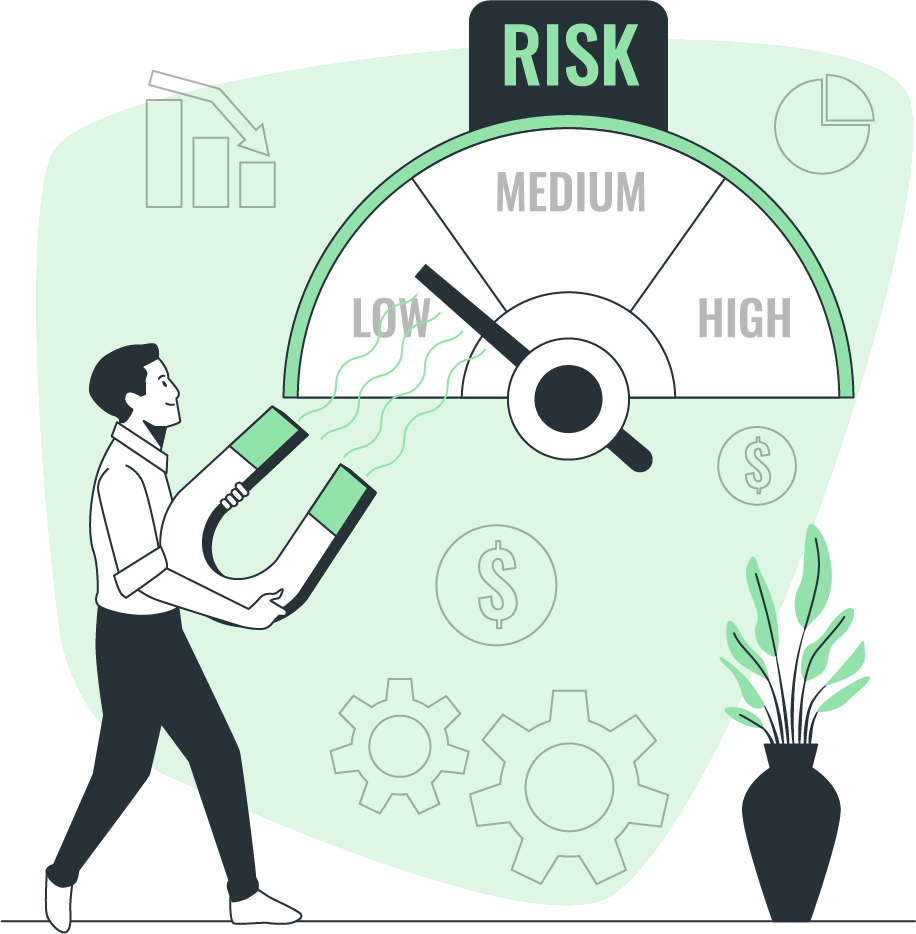Home » Risk Assessment Services
Risk assessment is an integral part of any business, big or small. It helps organizations identify potential risks that could affect the business and take appropriate measures to mitigate them. Risk assessment is a continuous process that should be carried out regularly to ensure that the business is protected from any potential threats. With the increasing dependence on technology and the rise of cyber threats, Risk Assessment has become even more important. In this article, we will be discussing the various types of risk assessments, the benefits of conducting a risk assessment, and how to get started. We will also be discussing why Risk Assessment Services are required and how Securium Solutions can help. Finally, we will answer some of the key security questions that businesses often ask.
Information Security Risk Assessment: This type of risk assessment focuses on evaluating the security of a business’s information systems and data. The assessment looks at the potential risks to the confidentiality, integrity, and availability of sensitive data and evaluates the effectiveness of the security measures in place to protect against those risks.
Cybersecurity Risk Assessment: This type of risk assessment focuses on evaluating the security of a business’s online presence and its exposure to cyber threats such as hacking, malware, and phishing attacks. The assessment includes an evaluation of the business’s network security, software security, and overall cyber hygiene.
Business Continuity Risk Assessment: This type of risk assessment focuses on evaluating the ability of a business to continue operations in the face of a disruptive event such as a natural disaster, cyberattack, or other crisis. The assessment looks at the business’s disaster recovery plans, backup and recovery procedures, and overall resilience.
Physical Security Risk Assessment: This type of risk assessment focuses on evaluating the security of a business’s physical premises and assets. The assessment looks at potential risks to the safety and security of employees, customers, and assets and evaluates the effectiveness of the security measures in place to protect against those risks.
Compliance Risk Assessment: This type of risk assessment focuses on evaluating a business’s compliance with relevant regulations and standards. The assessment includes an evaluation of the business’s compliance with data privacy regulations, industry standards, and other relevant requirements.
Operational Risk Assessment: This type of risk assessment focuses on evaluating the potential risks to a business’s operations. The assessment looks at the potential impact of risks such as supply chain disruptions, workforce shortages, and equipment failures and evaluates the effectiveness of the mitigation strategies in place to protect against those risks.
Improved risk management: By identifying and prioritizing risks, a risk assessment helps businesses to develop an effective risk management strategy. This can help businesses to mitigate potential risks and prevent losses, ensuring the continued success and stability of the business.
Increased efficiency: A risk assessment can help businesses to identify and eliminate inefficient processes and procedures, reducing the potential for waste and improving overall efficiency.
Better decision-making: By understanding their risk exposure, businesses can make informed decisions that are based on a thorough understanding of the potential risks and benefits of each decision.
Compliance with regulations: A risk assessment can help businesses to ensure compliance with relevant regulations and standards, reducing the risk of penalties and legal action.
Enhanced reputation: By demonstrating a commitment to risk management, businesses can enhance their reputation and increase consumer confidence.
Improved communication: A risk assessment can help to improve communication between different departments and stakeholders, fostering a more collaborative and cohesive approach to risk management.

How to Begin a Risk Assessment
Define the scope of the assessment: The first step is to determine the scope of the risk assessment. This could include specific business operations, departments, processes, or systems.
Identify potential risks: Once the scope of the assessment has been defined, the next step is to identify potential risks. This could include physical risks, such as theft or damage to equipment, or cyber risks, such as data breaches or network security incidents.
Evaluate the likelihood and impact of each risk: After identifying potential risks, the next step is to evaluate the likelihood and impact of each risk. This will help you to prioritize risks and determine which risks need to be addressed first.
Develop a risk management plan: Based on the results of the risk assessment, you can develop a risk management plan that includes steps to mitigate each risk. This could include implementing security controls, updating policies and procedures, or investing in new technology.
Implement the risk management plan: Once the risk management plan has been developed, it’s time to implement the steps to mitigate the risks. This could include implementing security controls, updating policies and procedures, or investing in new technology.
Monitor and review the risk assessment: The final step is to monitor and review the risk assessment regularly. This will help you to identify and address new risks, and ensure that your risk management plan remains effective over time.


Compliance: Many industries and businesses are subject to a range of regulations and standards that require regular risk assessments. For example, businesses in the financial and healthcare industries must comply with strict security and privacy regulations, and regular risk assessments are often required to ensure compliance.
Improved decision making: Risk assessment services help businesses understand the likelihood and impact of potential risks, which can inform decision making and resource allocation.
Better risk management: A well-conducted risk assessment can help businesses understand the types of risks they are exposed to and the mitigation strategies that are most effective. This information can be used to develop a comprehensive fall risk management plan that helps businesses better prepare for and respond to potential threats.
Protection of assets: Risk assessments help businesses understand the value of their assets and the risks that threaten them. By identifying potential threats and understanding their impact, businesses can take the necessary measures to protect their assets and minimize their risk exposure.
Better preparation: Risk assessments help businesses prepare for potential risks and ensure that they have the resources and contingency plans in place to respond effectively. By identifying potential risks and understanding their impact, businesses can develop response plans that minimize the impact of risks on their operations and reputation.
As a risk assessment service providers of risk management and Risk Assessment Processes, Securium Solutions has the expertise and experience to help businesses understand their risks and take the necessary measures to protect themselves. Our Risk Assessment Team of security experts has a deep understanding of security and risk management principles, and we use this knowledge to help businesses identify their risks and implement effective mitigation strategies.
One of the key benefits of working with Securium Solutions is our ability to provide a comprehensive range of Fall Risk Assessment Services. From information security risk assessments to cyber security risk assessments, we have the expertise to help businesses understand their risks and take the necessary measures to protect themselves. Our team of experts will work closely with you to understand your specific risks and develop a customized risk assessment plan that meets your unique needs.
Another benefit of working with Securium Solutions is our commitment to providing high-quality, reliable service. Our team of experts is dedicated to providing the highest level of service to our clients, and we take pride in the results we achieve for our clients. Whether you are a small business looking for a basic risk assessment or a large corporation looking for a comprehensive security audit, we have the expertise to help.

The scope of the risk assessment depends on the specific needs and requirements of your organization. Our cyber security risk assessment service will assess your organization’s information security systems, procedures, and processes to identify potential risks and vulnerabilities. The assessment will cover all aspects of your information security, including but not limited to network security, application security, physical security, and data privacy.
Potential risks will be identified through a comprehensive examination of your organization’s information security systems, procedures, and processes. The risks will be evaluated based on the likelihood and impact of each risk, and the potential consequences if the risk were to materialize.
Probabilistic Risk Assessment (PRA) goes beyond traditional risk assessment by incorporating probability distributions, offering a more comprehensive view of risk.
Based on the results of the risk assessment, we will provide recommendations for mitigating each identified risk. The recommendations may include technical solutions, policy changes, and training programs. Our goal is to provide a comprehensive risk management plan that addresses all of the risks identified during the assessment.
The risk management plan will be integrated into your overall business operations through the implementation of recommended security controls and the development of policies and procedures to support the risk management plan. Our goal is to provide a plan that is practical, sustainable, and that fits within the context of your business operations.
The frequency of the risk assessment review and update will depend on the specific needs and requirements of your organization. As a general rule, it is recommended to conduct a risk assessment at least once a year, or whenever there is a significant change in your information security systems, procedures, or processes.
The results of the risk assessment will be communicated to stakeholders through a detailed report that outlines the risks identified, the recommendations for mitigating each risk, and the risk management plan. The report will be delivered in a format that is easy to understand and that can be used to support decision-making and risk management activities.
Fall risk assessment helps healthcare providers identify patients at risk of falling, allowing for preventive measures.
What is the cost of Risk Assessment? This is the important question and the answer is that the cost of our risk assessment and risk management services will depend on the specific needs and requirements of your organization. Our goal is to provide cost-effective services that meet your needs and budget. We will provide a detailed quote for our services based on the scope of the assessment and the specific requirements of your organization.
Securium Solutions takes the privacy and security of our client’s data very seriously. We will implement appropriate security measures to protect your data during the risk assessment process. Our risk assessment services are conducted in accordance with industry best practices and standards, and we adhere to strict confidentiality agreements with all of our clients.
Securium Solutions stays current with the latest security
Staying informed about government initiatives and disaster preparedness is a good starting point.
Risk assessment service providers goal is ongoing support and resources to our clients after the risk assessment is complete. This may include training programs, support in the implementation of recommended security controls, and ongoing risk management activities. We will work with you to ensure that the risk management plan is effectively implemented and that your organization’s security needs are met.